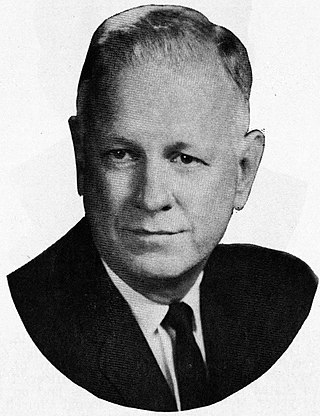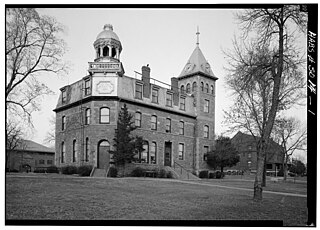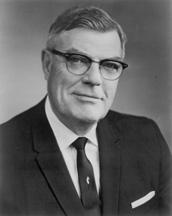Related Research Articles

Nils Andreas Boe was an American attorney who served as the 23rd Governor of South Dakota from 1965 to 1969. He served as a judge of the United States Customs Court, later the United States Court of International Trade.

Roswell Christopher Bottum is an American musician, best known as the keyboardist for the San Francisco alternative metal band Faith No More. He is also guitarist and co-lead vocalist for the pop group Imperial Teen, best known for their 1999 single "Yoo Hoo" used in the movie Jawbreaker. In addition to popular musical career, Bottum also scored three Hollywood movies and composed an opera entitled Sasquatch: The Opera, which premiered in New York in April 2015.

Yankton College was a private liberal arts college in Yankton, South Dakota, United States, affiliated with the Congregational Christian Churches. Yankton College produced nine Rhodes Scholars, more than any other South Dakota higher education institution.

Joseph Henry Bottum was an American politician. He served as the 27th Lieutenant Governor of South Dakota and as a member of the United States Senate from South Dakota.

The 57th United States Congress was a meeting of the legislative branch of the United States federal government, composed of the United States Senate and the United States House of Representatives. It met in Washington, DC from March 4, 1901, to March 4, 1903, during the final six months of William McKinley's presidency, and the first year and a half of the first administration of his successor, Theodore Roosevelt. The apportionment of seats in the House of Representatives was based on the 1890 United States census. Both chambers had a Republican majority.

The 70th United States Congress was a meeting of the legislative branch of the United States federal government, consisting of the United States Senate and the United States House of Representatives. It met in Washington, D.C., from March 4, 1927, to March 4, 1929, during the last two years of Calvin Coolidge's presidency. The apportionment of seats in the House of Representatives was based on the 1910 United States census.

The 59th United States Congress was a meeting of the legislative branch of the United States federal government, composed of the United States Senate and the United States House of Representatives. It met in Washington, D.C. from March 4, 1905, to March 4, 1907, during the fifth and sixth years of Theodore Roosevelt's presidency. The apportionment of seats in the House of Representatives was based on the 1900 United States census. Both chambers had a Republican majority.

The lieutenant governor of South Dakota is the second-ranking member of the executive branch of South Dakota state government and also serves as presiding officer of the South Dakota Senate. The lieutenant governor succeeds to the governorship if the office becomes vacant, and may also serve as acting governor if the governor is incapacitated or absent from the state.

The Vermont Senate is the upper house of the Vermont General Assembly, the state legislature of the U.S. state of Vermont. The senate consists of 30 members elected from multi-member districts. Each senator represents at least 20,300 citizens. Senators are elected to two-year terms and there is no limit to the number of terms that a senator may serve.

George McGovern, a Democratic Party politician from South Dakota, was first elected to the United States House of Representatives to represent South Dakota's 1st congressional district in 1956. He was re-elected in 1958, before making an unsuccessful run for the United States Senate in 1960 against Republican incumbent Karl Earl Mundt. After serving in the John F. Kennedy administration as director of the Food for Peace program, McGovern ran again for the Senate and narrowly prevailed over appointed Senator Joseph H. Bottum. In 1968, McGovern unsuccessfully sought the Democratic Party's presidential nomination at the Democratic National Convention and was re-elected to the Senate over former Governor of South Dakota Archie M. Gubbrud. In 1972, McGovern was successful in his campaign for the Democratic presidential nomination, but lost the election in a landslide to incumbent President Richard Nixon. McGovern was re-elected to the Senate in 1974 over Vietnam War veteran Leo K. Thorsness, but lost re-election in 1980 to then-U.S. Representative James Abdnor. McGovern made a final unsuccessful run for president in 1984 United States presidential election.

From March 14 to June 11, 1944, voters of the Republican Party selected delegates to the 1944 Republican National Convention for the purpose of selecting their nominee for president in the 1944 election at the 1944 Republican National Convention held from June 26 to June 28, 1944, in Chicago, Illinois.

Joseph Bottum is an American author and intellectual, best known for his writings about literature, American religion, and neoconservative politics. Noting references to his poems, short stories, scholarly work, literary criticism, and many other forms of public commentary, reviewer Mary Eberstadt wrote in National Review in 2014 that “his name would be mandatory on any objective short list of public intellectuals” in the United States. Coverage of his work includes profiles in The New York Times, South Dakota Magazine, and The Washington Times. In 2017, Bottum took a position at Dakota State University in Madison, South Dakota.
Henry C. Bottum was a farmer, American politician and member of the Wisconsin State Assembly.
Darius S. Smith was a South Dakota politician.
Roswell Bottum was an American farmer and politician.
Roswell Bottum was an American lawyer and politician.

The 1962 United States Senate election in South Dakota took place on November 6, 1962. Incumbent Republican Senator Francis H. Case ran for re-election to a third term. He won the Republican primary against Attorney General A. C. Miller, but shortly after the primary, died. The Republican State Central Committee named Lieutenant Governor Joseph H. Bottum as Case's replacement on the ballot, and Governor Archie Gubbrud appointed Bottum to fill the vacancy caused by Case's death. In the general election, Bottum was opposed by Democratic nominee George McGovern, the Director of Food for Peace and the former U.S. Congressman from South Dakota's 1st congressional district. The contest between Bottum and McGovern was quite close, with McGovern narrowly defeating him for election by just 597 votes, making him the first Democrat to win a Senate election in South Dakota since William J. Bulow's win in 1936.

John Frank Lindley was an American attorney and politician. He served in the South Dakota House of Representatives and as Lieutenant Governor of South Dakota.
References
- ↑ Doane Robinson (1914). HISTORY OF SOUTH DAKOTA. B. F. Bowen & Co. pp. 1804–1805.
- ↑ George W. Kingsbury (1915). George Martin Smith (ed.). HISTORY OF DAKOTA TERRITORY. Chicago: S. J. Clarke Publishing Company. pp. 1080–1083.